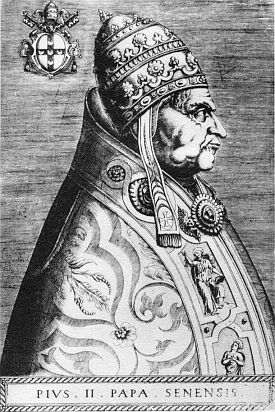The Triple Crown: An Account of the Papal Conclaves
by Valérie Pirie
< Prev T of C
... Plates
Prelim. Ch
XVth Century
XVIth Century
XVIIth Century
... Next >
Calixtus III
Pius II
Paul II
Sixtus IV
Innocent VIII
Alexander VI
PIUS II (PICCOLOMINI)
1458—1464

| |
|
ENGLAND
Henry VI
GERMANY
Frederick III
FRANCE
Charles VII
|
|
BESIDE the political pawns of the rival Italian States, two formidable candidates were on the ranks at the conclave which assembled at the
death of Calixtus III. They were Sylvius Piccolomini and Guillaume d'Estouteville, Cardinal of Rouen. The first had played an important
part at the Council of Bâle, where he had most eloquently upheld the supremacy of the council over the pope. He stood out among his
colleagues as the foremost personality. He was widely travelled, cultivated, clever, resourceful, had a vast experience of the world and was
flexible and deadly as well-tempered steel.

| PIUS II
From a print in the British Museum
|
|
|
The Cardinal of Rouen, his rival, had none of these qualities and knew it. So he did not waste his time or his energies on an unequal
struggle of wits, but put all his trust in the cupidity of his colleagues. To the Cardinal of Avignon he promised his Roman palace and the
coveted post of Chancellor. To Bessarion and the other Greeks he paid large sums of money.With the Italian cardinals he made various bargains which were all committed to writing and discussed and settled near the latrines, which spot offered the only semblance of privacy or
seclusion to be found within the precincts of the conclave. But even that malodorous sanctuary was evidently not proof against the prying
eyes of the conclavists, for Piccolomini got wind of the transactions just as everything seemed most satisfactorily settled, and turned the
tables by a daring and masterly stroke. As the cardinals assembled in the morning to hear Mass and proceed to the scrutiny which would
certainly have made Rouen Pope, they found Piccolomini standing across the threshold of the chapel, barring the entrance. With stirring
eloquence he adjured them not to elect a French pope. He drew a vivid picture of the Holy See transferred once more to Avignon; of Rome
deserted, of the trials and expenditure incurred by the cardinals perpetually on the roads and in perpetual danger. He hinted delicately at the
bargains that had been concluded but might so easily be repudiated; and when he considered his audience sufficiently [p. 20] impressed by
his persuasive fluency he led the way into the chapel confident of success. As soon as Mass was over the scrutiny took place and the
chalice containing the votes was deposited before the scrutators. As chance would have it, both Rouen and his supporter Colonna were
scrutators that day. Colonna examined each paper and handed it to Rouen, who read it aloud. Every cardinal bending anxiously over his list
of candidates marked the number of votes each one obtained. Then Rouen announced the total results, giving Piccolomini eight votes only.
Immediately there was a hubbub—Piccolomini leaping to his feet accused the scrutators of dishonesty; he appealed to the Sacred College
to witness that he had been robbed of a vote. The Cardinal Doyen thereupon called for a second tally, and Rouen, half fainting and
speechless with emotion, did not even attempt a protest. Piccolomini's name registered nine votes, and his partisans, wishing to follow up
this advantage, suggested the "accessus", which consists of a second ballot, the first votes being transferable orally to another candidate.
Two cardinals immediately gave Piccolomini their voices; only one more was needed now for him to reach the necessary majority. A
couple of Rouen's demoralised supporters hurriedly left the chapel under the only admissible pretext, but Bessarion, the bearded bugbear
of the lay cardinals in the last conclave, stood firm by his deserted patron. He had sufficiently deteriorated in the Roman atmosphere of
corruption to accept a large bribe from Rouen, but at any rate did not turn traitor. A moment of tense silence and expectancy now ensued. It
is said that Piccolomini's gaze travelled slowly round the assembled prelates and came to rest on Colonna with such a power of
concentrated authority and promise that he rose like an automaton to obey the unspoken command. But before he could utter a word Rouen
and Bessarion had flung themselves upon him in an attempt to silence him by main force. There was a violent scuffle, during which
Colonna managed to free himself sufficiently to pronounce the necessary formula. In a moment, the panting, dishevelled cardinals fell apart
and were prostrated in adoration. Piccolomini was Pope. Needless to say that Pius II utterly condenmed Cardinal Piccolomini's findings in
favour of the supremacy of the council over the pope, and with equal eloquence decreed the supremacy of the pope over the council.
Once having recanted his former indiscretions, Pius II pursued a consistent and virile policy. He was an able man, of dignified bearing, not
overburdened with scruples. He suffered martyrdom from the stone but bore pain with the most admirable stoicism, never letting it interfere
with his duties. A greater contrast to his successor could scarcely have been found.
Calixtus III
Pius II
Paul II
Sixtus IV
Innocent VIII
Alexander VI
< Prev T of C
... Plates
Prelim. Ch
XVth Century
XVIth Century
XVIIth Century
... Next >
|



